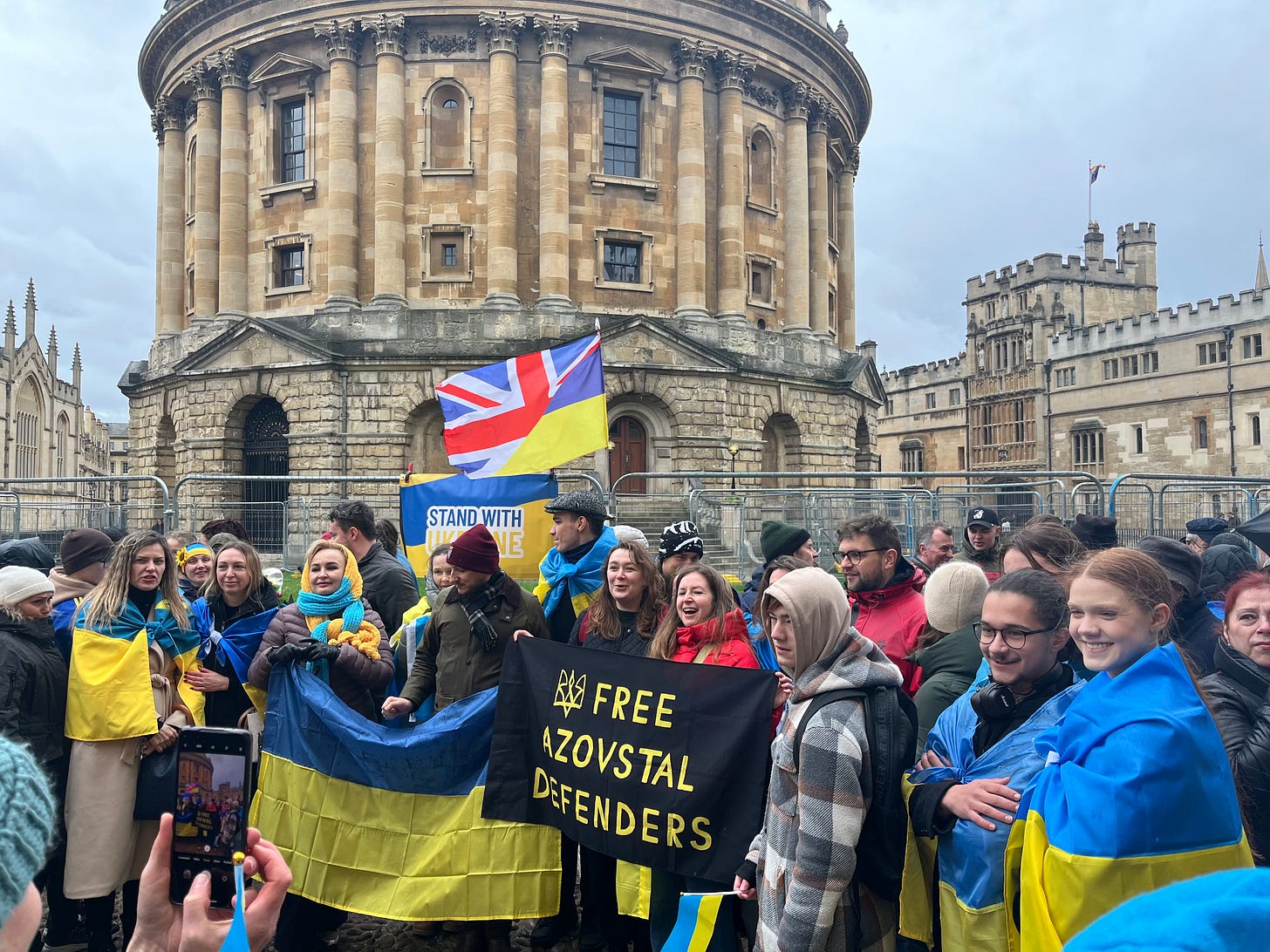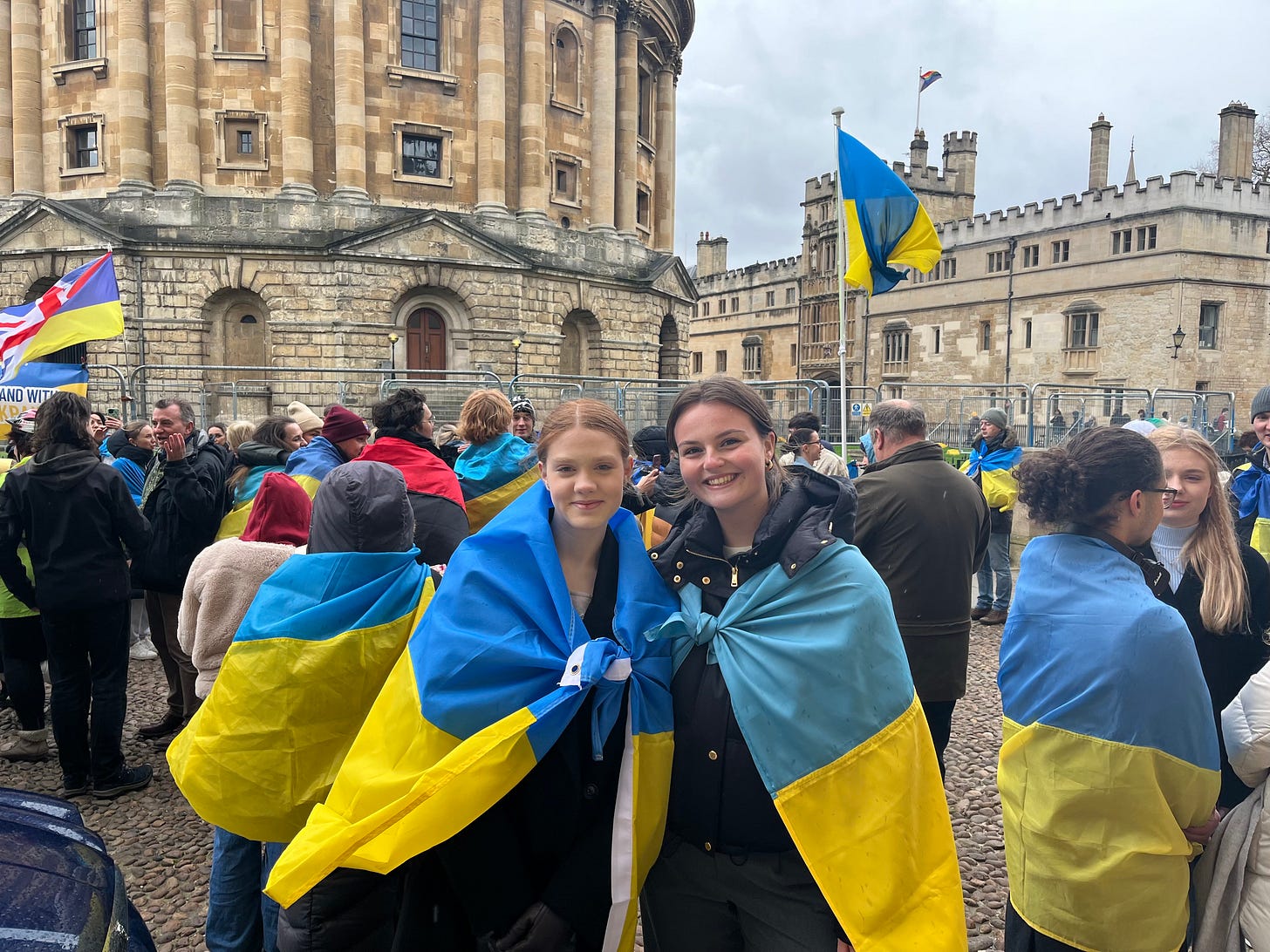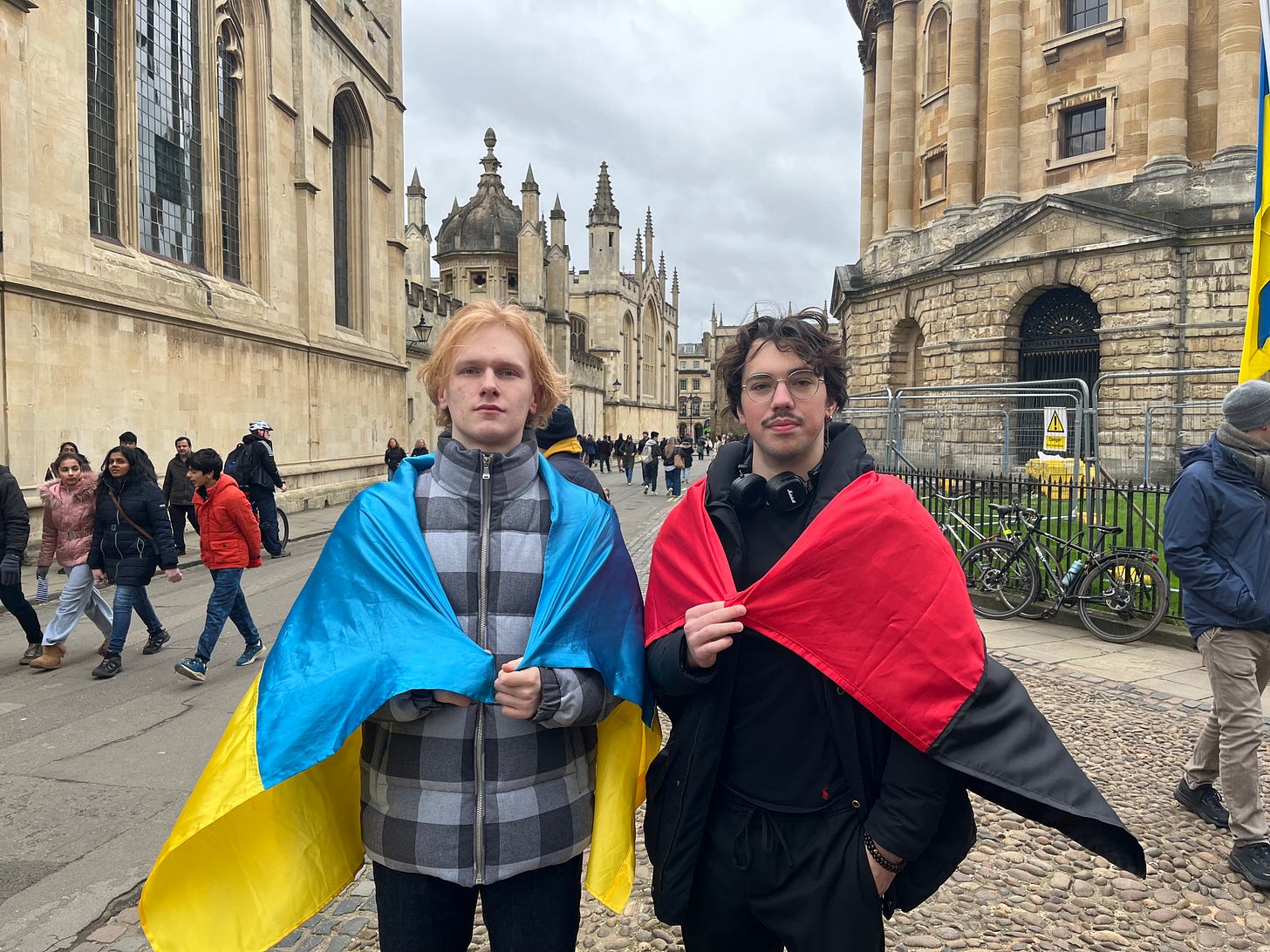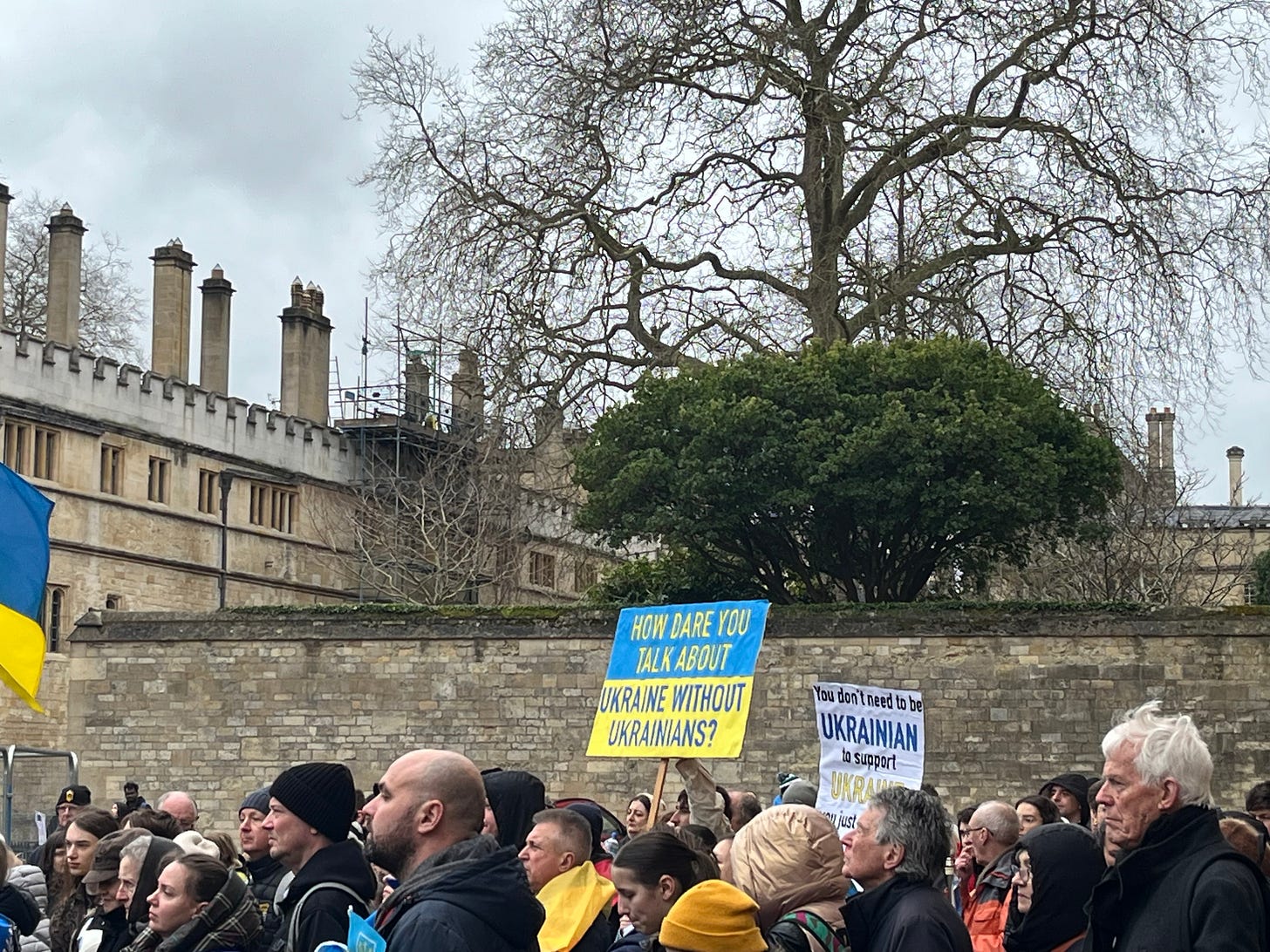Hundreds gather in Oxford in solidarity with Ukraine
As Donald Trump and Vladimir Putin engage in talks about Ukraine’s future, Ukrainians make their feelings heard as the war in their country reaches its third year.

On the eve of the third anniversary of Russia’s full-scale invasion of Ukraine, hundreds of people braved the unpredictable Oxford weather to stand in solidarity with those still fighting for freedom against Putin’s aggression.
A lot has happened in the last three years of brutal war, not least the many courageous stories of Ukrainians defending their homeland. But, perhaps, one of the most pivotal moments in the long and gruelling conflict, so far, has happened in the lead up to this third anniversary, and without a single Ukrainian being present: Donald Trump’s decision to begin negotiations with Vladimir Putin’s Russia about a peace deal in Ukraine.
Events like the one in Radcliffe Square, however, where Ukrainians, Georgians, Serbians, Lithuanians, Brits, and no doubt many other nationalities gathered, demonstrate one thing: Ukrainians aren’t ready to give up their country without a fight.
“You cannot reason with a tiger when your head is in its mouth,” says Nina Shestakova, quoting Gary Oldman’s Winston Churchill in the 2018 film, The Darkest Hour. Nina, a second-year Oxford Brookes University student from Ukraine, and member of the university’s Ukrainian society, talked to me about US President Donald Trump’s recent controversial decision.
“When Trump took over, he promised to end the war, but that’s not on our terms, that’s on Russia’s,” she said, with the yellow and light-blue Ukrainian flag draped over her shoulders. “Peace talks don’t mean Trump will end the war; it means Russia will win. That’s not our win.”
Nina is accompanied by her friend from the Brookes Ukrainian society, and fellow Ukrainian, Sofia Olesnevyeh. “We’re not against Americans, because we appreciate all the support that they’ve given us. The [frustration] is more about Trump and his government right now.”

The event, organised by a group of charities and societies helping Ukrainians in Oxford and the UK, was a moving one. Emotional first-hand accounts of the war were read aloud by those who’ve been in Ukraine since the war began, traditional Ukrainian songs were sung, and many tears were shed. But the atmosphere was one of togetherness; with the feeling of mutual determination amongst everyone to continue raising awareness of the war rife.
“We just need to remind people that the war is still going on, and that Ukrainians are still suffering from shelling and other brutal war crimes at the hands of the Russians,” says Fedir Nevesenko, 21, who’s from Kyiv but studies in Oxford.
Fedir is again draped in a flag, but this time it’s not the yellow and light-blue national flag – although it is in the same two-colour horizontal form – but it’s a red and black one. He explained to me that this is the flag of the Ukrainian Insurgent Army, a symbol of nationalism used by Ukrainians in the Second World War to fight both the Nazi’s and the Soviets, which is now being used again as a sort of unofficial national flag for Ukrainians fighting invaders for their freedom at home once again.

Since the war started, the UK has taken in around 254,000 Ukrainian refugees, according to data from the House of Commons Library. And some of those refugees are like Olha Bondarenko, from Dnipro, Ukraine, who moved to the UK in April 2022 with her two children. In the three years since, she’s learnt English, found a job as a shop assistant, and recently took a course in accounting to help her find a job like her old one back in Ukraine, where she worked in a bank. This is done, she said, in the hope the new job might help her to improve the lives of her children.
“I feel sad,” she says while holding a donation bucket to help fund those Ukrainians in need. She’s worried about the ongoing situation between the two ‘superpowers,’ the US and Russia. “I’m a little bit stressed about what’s going to happen next.”
Her message to Donald Trump? “Ukraine has been independent for the last 30 years, and people in other countries [like the US] can’t force an independent country to do something that they don’t want to do,” she says.
Donald Trump labelled Ukrainian president, Volodymyr Zelenskyy a “dictator” last week in a tit-for-tat exchange after the Ukrainian war leader stated that Trump was living in a Russian "disinformation space."
President Zelenskyy, however, has now even said that he’s willing to step down as the nation’s leader if it were to guarantee a lasting peace and importantly Ukrainian NATO membership.
Oxford, and the UK, can sometimes feel like a long way away from Ukraine. But as Brookes Ukrainian Society member, Nina Shestakova, said to me, there are a lot of things people can do in the UK to help the Ukrainian cause. “People can show up to events we do, as well as donating and reposting [on social media] that you’ve donated. This is because then if someone isn’t donating, they might see your post and then decide to donate too.”
Elsewhere in Oxford, others are doing great work to help the Ukrainian community since the war started. One of those is Debbie Hollingsworth, who is the Team Manager of the Ukraine Wraparound Service in Oxfordshire. The group operates as part of the charity Connection Support and receives funding from Oxfordshire County Council as well as partnering with Refugee Resource. Debbie and those she works with have been helping Ukrainians in the area with some of the practicalities that come with living in the UK, as well as trying to support their well-being.
Asked what people in the area could do to support her and Ukraine Wraparound further, she was quick to point out that there is already “so much support for the Ukrainian community.” However, she did point to one area where there could be improvement: “I think the only thing [which could help] is more English provision. If we could get a bigger pool of volunteers that would work one to one with people or run a small class with people for next to nothing [that would be a benefit].
It should be said that this year marks the 80th anniversary of the end of another war: the Second World War in Europe; a war of good vs evil, arguably just like the one we are seeing in Ukraine today. Ahead of the beginning of that long conflict, Britain’s then Prime Minister, Neville Chamberlain, claimed “peace for our time” in 1938 after allowing Hitler’s forces to occupy the Sudetenland in Czechoslovakia, without the permission of the Czech government, to avoid a wider conflict – sound familiar? Winston Churchill said of the decision at the time, and, perhaps, Donald Trump should take note: “You were given the choice between war and dishonour. You chose dishonour and you will have war.”



